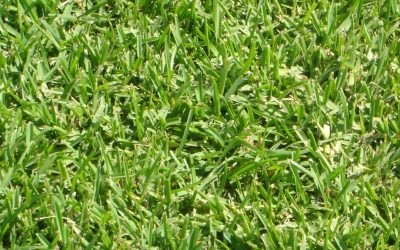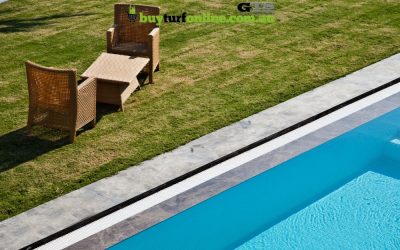Sapphire vs Sir Walter Buffalo: Which One is Better
Quick Links
Sapphire vs Sir Walter Buffalo: Which One is Better
Creating a beautiful lawn requires careful planning on which type of grass to use.
There are different factors that you need to consider when making this decision including the amount of shade or sunlight your lawn receives, traffic and maintenance requirements.
With all the different turfs available in Australia, it’s easy to get overwhelmed when choosing a turf to achieve a great lawn.
If you are like many homeowners who are torn between Sapphire and Sir Walter buffalo grasses, this guide is for you.
Let’s check the features of Sapphire and Sir Walter turf so that you can decide for yourself which of these two suits your needs.
Sapphire Buffalo Grass
Characteristics
Sapphire buffalo has a deep green colour with a tinge of blue. It has a fine texture that is soft underfoot.
Its leaves tend to fold back, giving it a finer and denser appearance.
This buffalo grass maintains its winter colour even after a few winter frosts. You can be assured that you’ll have a good-looking lawn all year round.
Growth Rate
Sapphire buffalo takes up to three weeks to establish, and longer in winter. Once established, it grows rapidly.
Because of its fast growth rate, it can easily recover in high-traffic situations. It also makes it harder for weeds to take over.
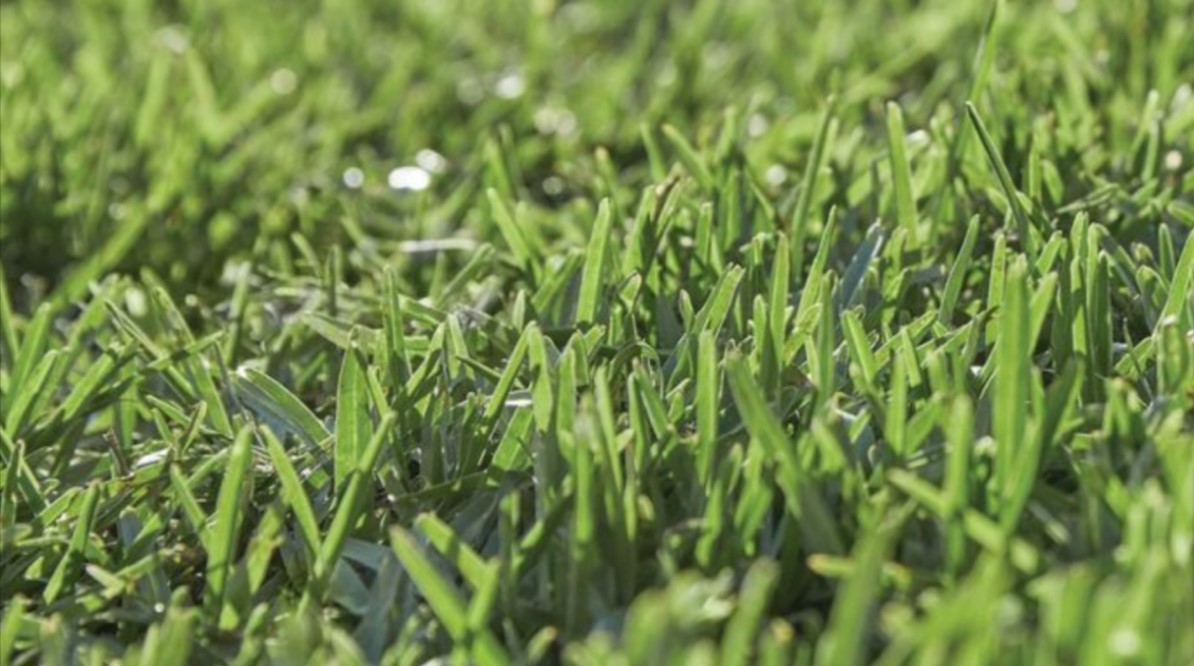
Just like most buffalo varieties, Sapphire buffalo has high drought tolerance once fully established.
However, it does require a lot of watering when newly installed.
Sapphire buffalo thrives in different parts of Australia and it prefers loam soil, loamy sand soil and sandy loams. It’s a durable turf with a good recovery rate.
While it performs well under full sun, it also has a high shade tolerance. This shade-tolerant grass can grow with as little as three hours of daily sunlight.
Maintenance
Sapphire buffalo is a low-maintenance turf. Here are some of its requirements:
Mowing
Mowing Sapphire buffalo depends on whether it is in full sun or partial shade.
If in full sun, the ideal mowing height is between 35 and 45 millimetres while in shade, you can mow as long as 60 millimetres.
Watering
This drought-tolerant grass needs proper watering to establish and develop deeper roots. After laying down the turf, start watering your new lawn.
Water at least 2 cm so that the water will reach beneath the turf. Keep the soil moist and if not, water again.
It’s best to water your Sapphire buffalo in the morning to reduce water loss.
After a month from installation, you can reduce the frequency of watering as this grass prefers less frequent deep watering.
During the summer, you need to water twice a week in the morning.
Fertilising
Like other buffalo varieties, Sapphire buffalo would also benefit from getting a slow-release fertiliser one month after installation.
When already established, you can use a complete fertiliser in early April and September to achieve the best results.
Weed Management
Although this buffalo grass is weed-resistant, you can still expect these bothersome plants to appear on your lawn.
If it happens, try removing them by hand as early as possible because it becomes more difficult to manage weeds when the seed heads already appear.
You may consider applying herbicide when there’s weed infestation.
Pest Management
Sapphire buffalo is resistant to pests and fungi so it does not require regular application of herbicides or fungicides.
However, it is susceptible to damage due to African Black Beetle and lawn grub such as armyworm or webworm.
If infestation occurs, consult your lawn care provider for the appropriate product to use.
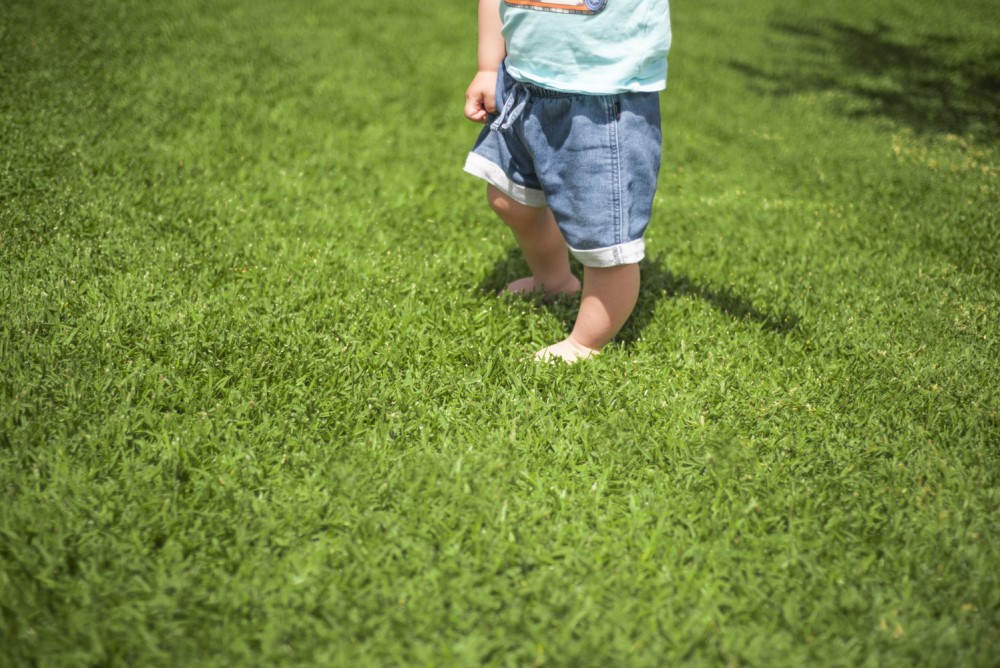
Sir Walter Buffalo
Characteristics
Bred in Australia, Sir Walter has quite a rich history. The first recording of it being grown in the country was in the 1820s and in recent years, it has become one of the popular choices for home and business owners.
The popularity of Sir Walter is due to the fact that it is among the finest and softest buffalo lawn grass varieties available in the country. It has soft broad leaves that are friendly to kids and pets.
Sir Walter DNA-certified buffalo looks gorgeous in its dark green colour. It keeps its vibrant colour all year round.
As this soft-leaf buffalo originated in Australia, it is adaptable to most Australian climates due to its high drought and shade tolerance. It does not mind extreme weather conditions.
Growth Rate
Sir Walter DNA-certified buffalo grass grows tightly, making your lawn appear thick and lush. Because of this attribute, it is highly resistant to weeds and reduces pollen.
Moreover, because of its rapid growth rate, it has a high wear tolerance. As it is hard-wearing, it’s a great turf for high-traffic areas or lawns frequented by kids and pets.
Sir Walter DNA certified establishes more quickly than Sapphire and other buffalo grasses. It can tolerate shade and grows well under full sun.
Sir Walter buffalo turf has a self-repair capability. It easily grows back after substantial damage, making it a great option for backyard cricket.
Maintenance
Mowing
Sir Walter soft leaf buffalo requires less mowing. If you prefer to achieve a spongy lawn, you can mow your grass to 25 millimetres.
On the other hand, if you want a tight lawn, 20 millimetres is recommended.
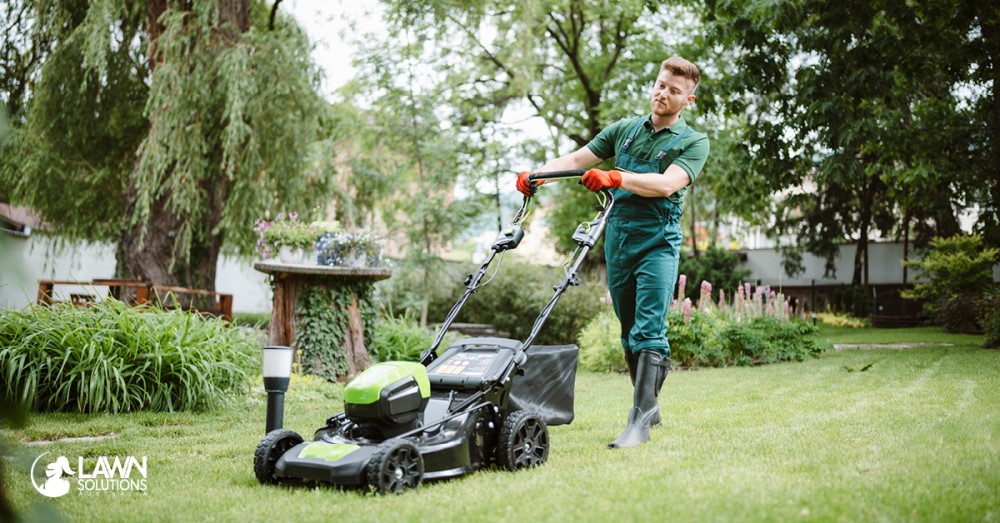
Watering
Compared to other turfs, Sir Walter buffalo grass does not require much watering.
In the summer, you can water it once every two weeks while in winter, there’s no need to water. Less frequent but heavy watering encourages a deep root system.
For best quality results, water your Sir Walter buffalo turf early in the morning. By doing so, you can reduce the risk of fungal infections and other diseases.
Fertlilising
Applying fertiliser in late autumn helps maintain the colour of this soft-leaf buffalo grass during winter.
However, if you live in a place where the soil is sandy, it’s recommended to fertilise your lawn every two months.
Weed Management
This low-maintenance buffalo grass is weed resistant but if they appear, your first option for weed management is to manually remove them by hand.
Pick the clippings immediately after mowing to minimise spreading weed seeds. When weeds become a headache, spray your lawn with a herbicide that is safe for Sir Walter.
Pest Management
Sir Walter buffalo grass is highly resistant to pests and diseases. Homeowners who chose Sir Walter grass do not have to worry about pests and infections.
Factors to Consider When Picking the Best Turf
It’s hard to choose between two popular varieties of turf especially if they both have many great attributes.
If you need a new lawn and are considering Sapphire or Sir Walter, here are some of the factors that you need to consider before making a decision.
Appearance
Sapphire has slightly thinner leaves and a finer look compared with Sir Walter buffalo grass. However, when it comes to texture, both Sir Water and Sapphire varieties are soft underfoot.
Both turfs maintain their colour all year round but many homeowners prefer the vibrant green colour of Sir Walter as it looks aesthetically more stunning.
Maintenance
Both Sir Walter and Sapphire buffalo turfs are not hard to maintain. They can survive with less watering even during the summer. Both varieties stifle the growth of weeds so you don’t have to apply herbicides frequently.
Between these two varieties, Sir Walter buffalo needs slightly more mowing than Sapphire.
The main advantage of Sir Walter buffalo in maintenance is that it does not require frequent fertilisation unless you have sandy soil.
It is also highly resistant to fungal infection and diseases so you have nothing to worry about these common issues that other homeowners with a different kind of turf have to deal with.
Shade Tolerance
Shade tolerance is the ability of the grass to grow without full sunlight. A shade-tolerant turf is perfect for shady areas.
Sir Walter and Sapphire buffalo are among the best-performing turfs under shade.
However, based on our experience, Sapphire is slightly more shade tolerant than Sir Walter buffalo but the difference is not much of a deal breaker.
Of course, if your lawn received more sunlight, shade tolerance is the least of your concern.
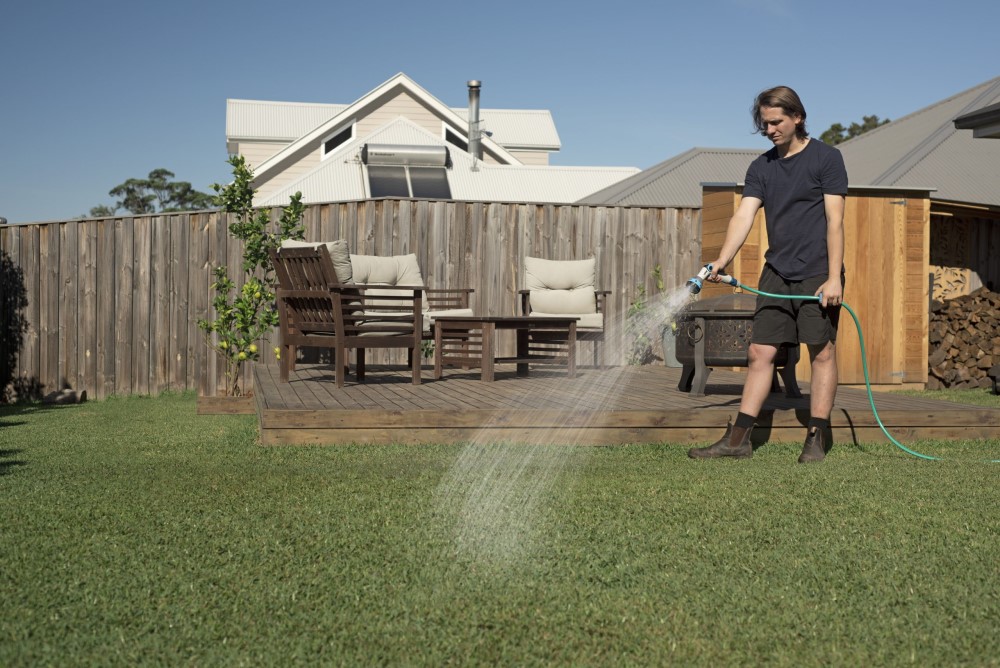
Drought Tolerance
Drought-tolerant lawns can withstand high heat levels and dry conditions which is common in many parts of Australia.
They can survive with very little water and easily bounce back once the drought is over.
Both Sir Walter and Sapphire buffalo grasses are drought tolerant. They can grow in full sun and can survive drought without significant damage.
Wear Resistance
If you have pets and kids who like to play on your lawn, you should consider choosing a hard-wearing turf.
Sapphire and Sir Walter buffalo have high wear resistance, but there’s a huge difference between them. Out of 5, 5 being the highest wear resistance rating, we rated Sapphire 3 and Sir Walter Buffalo 4.5.
The latter has higher wear resistance because it can tolerate high traffic and rapidly recovers from it.
Our Pick
Overall, Sir Walter (DNA-certified) is better performing in high-traffic lawns. It is the best grass for those looking for a kid and pet-friendly turf.
Because of its many strong points compared with other buffalo grass varieties, it has become one of the most popular turf varieties in Australia.
Sir Walter has been a favourite for lawns around Australia for many years now. It is tough, shade-tolerant, hard-wearing, and suitable for most soils and climates.
it’s important to note that when buying Sir Walter, make sure that you are getting from an AusGap-certified seller to ensure quality.
Comparison Guides
- Sir Walter vs Sir Grange Zoysis
- Sir Walter vs Tiftuf
- Sir Walter vs Empire Zoysia
- Sir Walter vs Sapphire Buffalo
- Sir Walter vs Palmetto Buffalo
read more!
recent posts
Sir Walter Buffalo vs TifTuf: Which One is Better
Compare Sir Walter Buffalo and TifTuf turf for Australian lawns. Discover key differences in shade tolerance, drought resistance, wear, maintenance & which is best for your yard.
Poolside Turf: Choosing and Maintaining Grass Around Pools
There’s nothing quite like stepping out of a swimming pool onto soft, lush grass. But when it comes to finding the best grass for around a pool, not all lawns are created equal. Chlorine pools, heavy foot traffic, and the unforgiving Australian sun can take a toll on...
Keeping Your Lawn Green and Healthy During the Summer Heat
Discover the best grass options for your lawn with our complete guide. Make informed choices for a lush, healthy yard. Read more to find your ideal grass!

Our Turf
TifTuf Bermuda
Buy Turf Online © 2019 All Rights Reserved. | Proudly Designed and Developed by Sydney ICT

